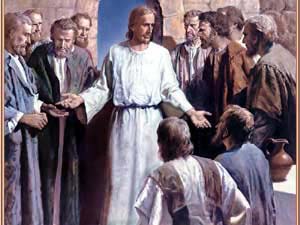The first-ever New Year’s Eve was celebrated in 2000 B.C. in Mesopotamia. Believe it or not – they celebrated the first-ever New Year in March!
While chugging your tenth drink and waiting for the clock to hit 12, you probably never had stopped to wonder when was the first-ever New Year’s Eve celebration.

By Marguerite Martyn – Original publication: St. Louis Post-Dispatch, January 4, 1914, Editorial Section, Page 1 (first slide of microfilm roll). Immediate source.
Most of us enter the New Year with beautiful wishes, surrounded by dear people and in the right mood. Celebrating the New Year’s eve symbolizes forgetting old worries and moving into a better future.
But, have you ever thought when the first New Year’s Eve was celebrated and who celebrated it? Celebrating it is one of humanity’ s oldest customs.
Contents
Who Invented the New Year’s Eve Party?
Some say that the Chinese first celebrated the New Year; others say it was the ancient Romans who invented it. All cultures and nations who use the calendar celebrate and look forward to the New Year’s Eve.
The First-Ever End of the Year Celebrations Across Cultures
Depending on which part of the world you are in, there are 3 most predominant New Year Eve celebration origins – the Roman New Year, the Chinese New Year, and the Russian/Protestant New Year.

By Leandro Neumann Ciuffo – Feliz 2013, CC BY 2.0
The history of New Year celebrations is not well known. Still, researchers believe that the Babylonians were the first to celebrate the New Year in 2000 B.C. in Mesopotamia. They celebrated it in mid-March, during the vernal equinox.
Facts About the Roman New Year’s Eve
The Romans also celebrated the New Year, but their calendar followed the lunar cycle. It means they had New Year’s Eve at the beginning of March.
It was like that until Emperor Julius Caesar, in 46 B.C., set January 1st as the beginning of the New Year.
Difference Between Solar Year and the Lunar Year
Since the lunar calendar wasn’t synced with the Sun anymore, Caesar’s astronomer convinced him to use the solar new year instead of the lunar new year.
Moreover, the new Roman New Year was dedicated to Janus, a god with two faces, one looking forward, and the other looking back.
For Romans, the New Year represented a symbol of the beginning of a new life and new hopes for the future. This custom and the meaning attached to the New Year have remained to this day.
Facts About the Chinese New Year’s Eve
The Chinese celebrate the New Year’s eve similar to the old Romans. The Chinese New Year’s Day is on the first day of the lunar calendar, meaning they celebrate the Lunar New Year.
Facts About the Russian/Protestant New Year’s Eve
Until the 10th century, the Russians celebrated the New Year on March 1st because of the arrival of spring. The Russians celebrated the New Year in honour of the Sun, and their rituals had a magical meaning.
The Old Germans, Catholics and Protestants Celebrations
Next, the Old Germans began celebrating the New Year as a sign of the changing seasons. Winter in the Old German country starts around mid-November, which was the time when old Germans harvested every fruit they grew.
As everyone was gathering then, glad for the harvest and rest that was coming, the old German rejoiced, and so their holiday began.

By Stig Nygaard from Copenhagen, Denmark – Tivoli Garden fireworks, CC BY 2.0.
Albeit, the beginning of the Old German New Year, was in the month of November.
Catholic and Protestant New Year’s Eve
What does the New Year celebration mean for Catholics and Protestants?
For Catholics and Protestants, the New Year’s Eve is the memory of St. Sylvester, the 34th pope’s death on December 31st.
The reform of the Gregorian calendar in 1582 restored January 1st as New Year’s Day in Europe.
What Are Your Plans for New Year’s Eve?
People well versed in mythology and symbology, say that the New Year symbolizes the regeneration of the universe, the promise of new growth, and the longing for renewal.
What will your New Year’s Eve look like? If you are looking for some nice holiday songs, check out the first-ever Christmas Songs.




